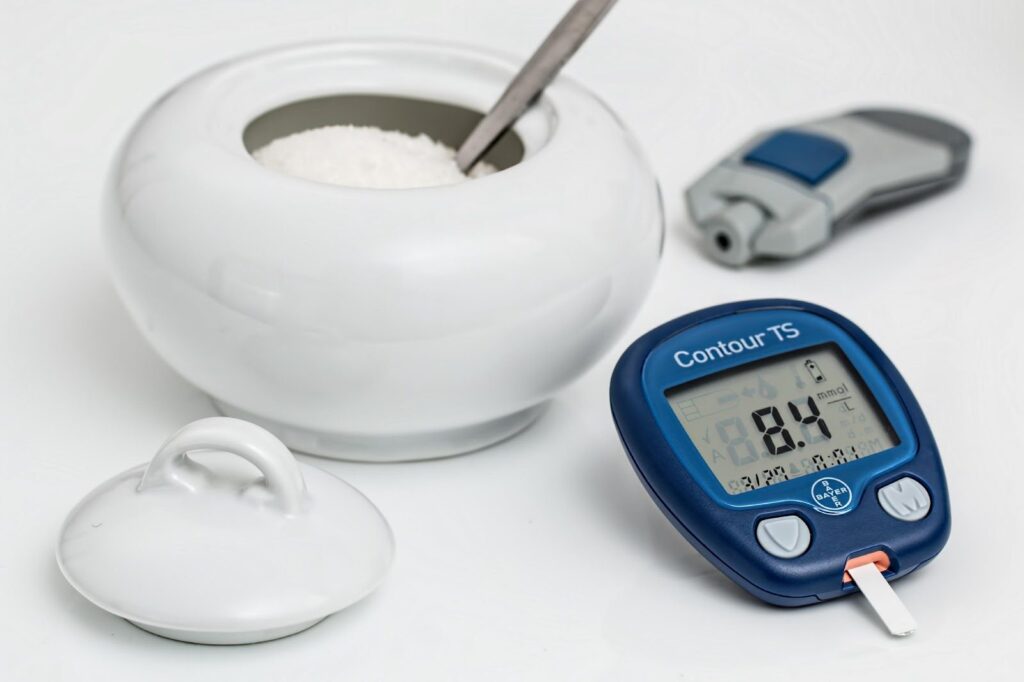Did you know that sometimes blood sugar issues are not diet related at all? Contrary to popular belief, blood sugar can be elevated by a lot more than sugary candies and cakes. Excessive and prolonged stress can be just as dangerous as a poor diet. The good news is that you can reverse prediabetes and diabetes in many cases.
By reversing prediabetes and diabetes you can also improve cardiovascular disease because the blood sugar increases cause damage to arteries and allow for cholesterol to get in the lining of the artery which, when builds up leads to clogging. Clogging of arteries with excess cholesterol, known as plaquing, can block proper flow of blood to the heart, brain and other areas of the body.
Being sedentary can also have a negative effect on blood sugar. Looking at the typical sedentary American lifestyle, it’s no surprise that so many Americans are diabetic. Should you be worried? If you wake up in the middle of the night needing to snack, you have excess thirst, if your mood changes drastically when you haven’t had food for some time or you are excessively sleepy after meals, you may have a blood sugar imbalance that should be investigated.
The Four Elements of a Blood Sugar Balanced Lifestyle
Diet, exercise, and stress all play an important role in managing blood sugar. The more stressed we are in life, the easier it becomes to stop exercising and eating right. The key is to create a routine for your life that includes a healthy diet, exercise and stress management. Doing so will allow you to prevent cardiovascular disease and should have a positive impact on your weight, too.
1. Stress management
You stress yourself out with a cluttered schedule and a cluttered home. When your stressed, your body goes into fight or flight mode and releases cortisol and extra glucose into the bloodstream to “escape” away from a perceived threat. The problem here is that your body doesn’t know when that threat is no longer a threat when all day long little stressors compound and if you sit all day long you can’t effectively burn the glucose that is being pumped into your system leading to steady weight gain.
Don’t let a day go by without moving your body a little bit. When times get stressful, take deep breaths with a 5-count inhale and 7-count exhale and get up and take a stroll. Focusing on deep breathing regularly in the morning and at night helps keep stress in check by resetting your fight or flight response system. Making it a point to move every hour helps your body burn glucose better and in turn improves your metabolism.
2. Diet
A lot of people are currently doing low/no carb diets such as keto. Yes, you can lose a lot of weight doing this type of diet, but proceed with caution. Especially if you are under a lot of stress as these types of diet can rob the body of needed carbohydrates overnight for recovery and repair. If the body already has trouble utilizing carbohydrates this could make your situation worse by further slowing your metabolism and causing your liver and muscles to dump excess glucose into the bloodstream overnight causing your morning blood sugar to be elevated and you to feel nauseous or not hungry for hours in the morning. If you already are testing your blood sugars in the morning see if having a 20-25 gram carbohydrate portion with dinner or as an after dinner snack helps you to have lower blood sugars in the morning as well as stop the morning nausea or lack of hunger.
Also, keeping your meals with balanced portions helps balance blood sugar all day. When you eat, your pancreas releases an amount of insulin based on your prior meal, so if you had a large breakfast and a small lunch, your pancreas can release too much insulin for lunch making you feel sleepy after lunch as you will have released too much insulin to counter a lower amount of carbohydrates. For anyone struggling with blood sugar issues, and/or stress research has shown that a higher percentage of fat and protein for breakfast and lunch and a higher percentage of carbohydrate for dinner than protein and fat works well to keep blood sugar in check.
Quick Diet Tips to Keep Blood Sugar Balanced
– Eat every 3-4 hours. 20-30g protein for breakfast with 10-20 grams of good fats
– Eat at least 30-40 grams of carbs in the form of a whole sprouted or pressure cooked grain/legume/sweet potato/squash with dinner
– Be careful with stevia and artificial sweeteners, they can still spike blood sugar
– Eat lots of dark leafy veggies every day
– Most fruits are usually OK just not in the same meal as grains – too many carbs!
– Meal prepping for the week can help you to keep your portions balanced
3. Exercise
Studies show that 10 am is the ideal time of the day to work out, but most people have to exercise at a different time before or after work. First thing in the morning is popular because of our schedules. It can be a little hard on the body but it needs to be done to keep your metabolism running properly.
Quick Exercise Tips to Keep Blood Sugar Balanced
– Get 30 minutes of cardio 5 days a week – you can get cardio by: lifting weights with minimal rest, body weight exercises with minimal rest; circuit training
– Walking is great – changing terrain is even better
– Interval style cardio is recommended – tabata style, HIIT
– Weight lifting is important too – the more muscle you have the more glucose you can burn
4. Routine
Organize your life! Get into a routine for every day. Develop a system for how you will balance your lifestyle of work, play, healthy diet and exercise. This is vital for reducing stress and preventing health problems.
In the Morning
– Watch the amount of sugar in your coffee and remember caffeine increases cortisol
– Swap breakfast for dinner foods: Focus on protein, good fats, and a smaller amount of good carbs for breakfast
– 20-30 grams of protein for breakfast, 10-20 grams of fat and 15-20 grams of carbs for breakfast
– Take a brisk 10 minutes walk after breakfast or do 30 air squats to maximize metabolic burn
During the Day
– Eat every 3-4 hours
– 20-30 grams of protein for lunch, 10-20 grams of fat and 15-20 grams of carbs for lunch
– Eat 6-8 cups of leafy greens every day or drink a green smoothie
– Move throughout the day – if your job is sedentary get up and walk around every hour
– Take a brisk 10 minute walk after lunch or do 30 air squats to maximize metabolic burn
– Working out after work is ok as long as you fuel your body properly – don’t be afraid of carbs!
At Night
– 20-30 grams of protein for dinner, 10-15 grams of fat and 30-40 grams of carbs for dinner
– Movies you watch could spike your blood sugar! Made worse if you’re eating popcorn or candy
– Eat more carbs in the evening to stabilize blood sugar overnight – grains, potatoes, etc.
– Don’t eat after 7pm
– Take a walk in the evening after dinner to wind down from the day and relieve stress
What to Do If You Are Prediabetic or At Risk
You don’t have to take blood sugar lowering medication when your pre-diabetic or newly diagnosed. If you take charge of your lifestyle, you can reverse diabetes! Along with healthy diet, exercise, stress relief, and routine, there are natural supplements you can take to help keep your blood sugar balanced.
Natural Blood Sugar Balancers
– Berberine – helps lower blood sugar, balance cholesterol and balance bacteria in the gut
– Can work better than the medication metformin. – take 1,500 mg before bed
– Prevent inflammation with turmeric – Meriva by Thorne – take once a day
– Magnesium (I like bis-glycinate or malate forms best) helps get glucose in the bloodstream – take 500-800 mg a day
– Take a probiotic with breakfast – there’s a big connection between gut bugs and blood sugar
– The more yeast in our system the more our gut bugs will make us crave sugars and carbs!
Tests for You and Your Doctor:
If you are prediabetic, it’s important to test your blood glucose levels throughout the day. Testing 1-2 hours after each meal allows you to learn how different foods affect you. Test 4 times a day: when you first wake up and 2 hours after breakfast, lunch, and dinner.
Ask your doctor for:
– The hemoglobin A1c test
– Lipoprotein fractionations
– Insulin, serum
Avoid Cardiovascular Disease by Balancing Blood Sugar
Now that you know how stress affects your blood sugar, start taking steps to balance your lifestyle today. Set a routine that includes meal planning and prep, daily exercise and de-stressing time that is fun. If your doctor told you that you’re prediabetic, don’t freak out. Just take charge. You can turn this around and if you follow the steps in this post you will be well on your way to doing so. By keeping your blood sugar in check you’ll not only be preventing diabetes you’ll be preventing cardiovascular disease from developing as well. I know you can do this, what are you waiting for? Start today!
If you enjoyed Dr. Jannine Krause’s blog post there’s a podcast dedicated to this very topic! Click HERE to listen to the podcast.
youtube





